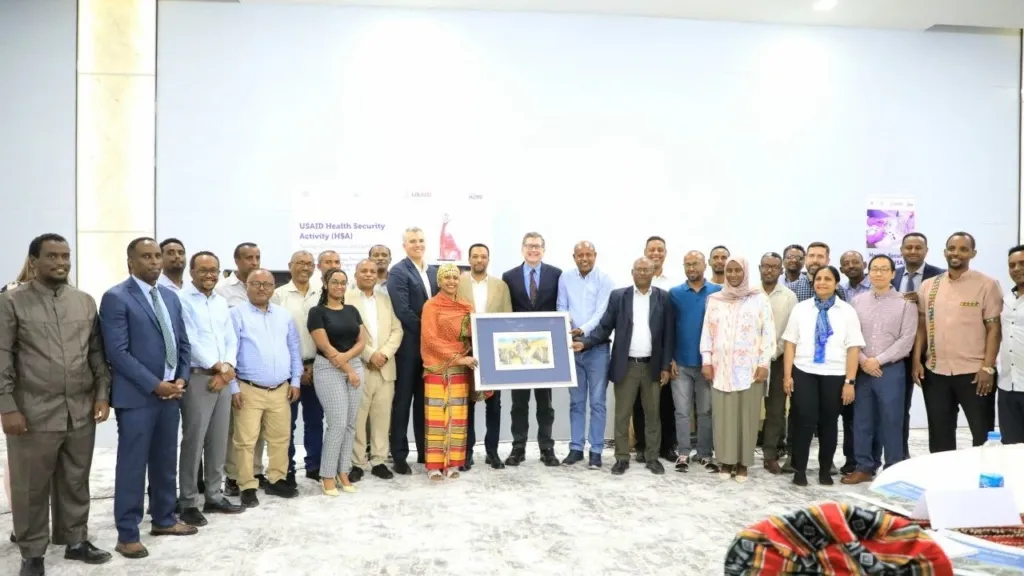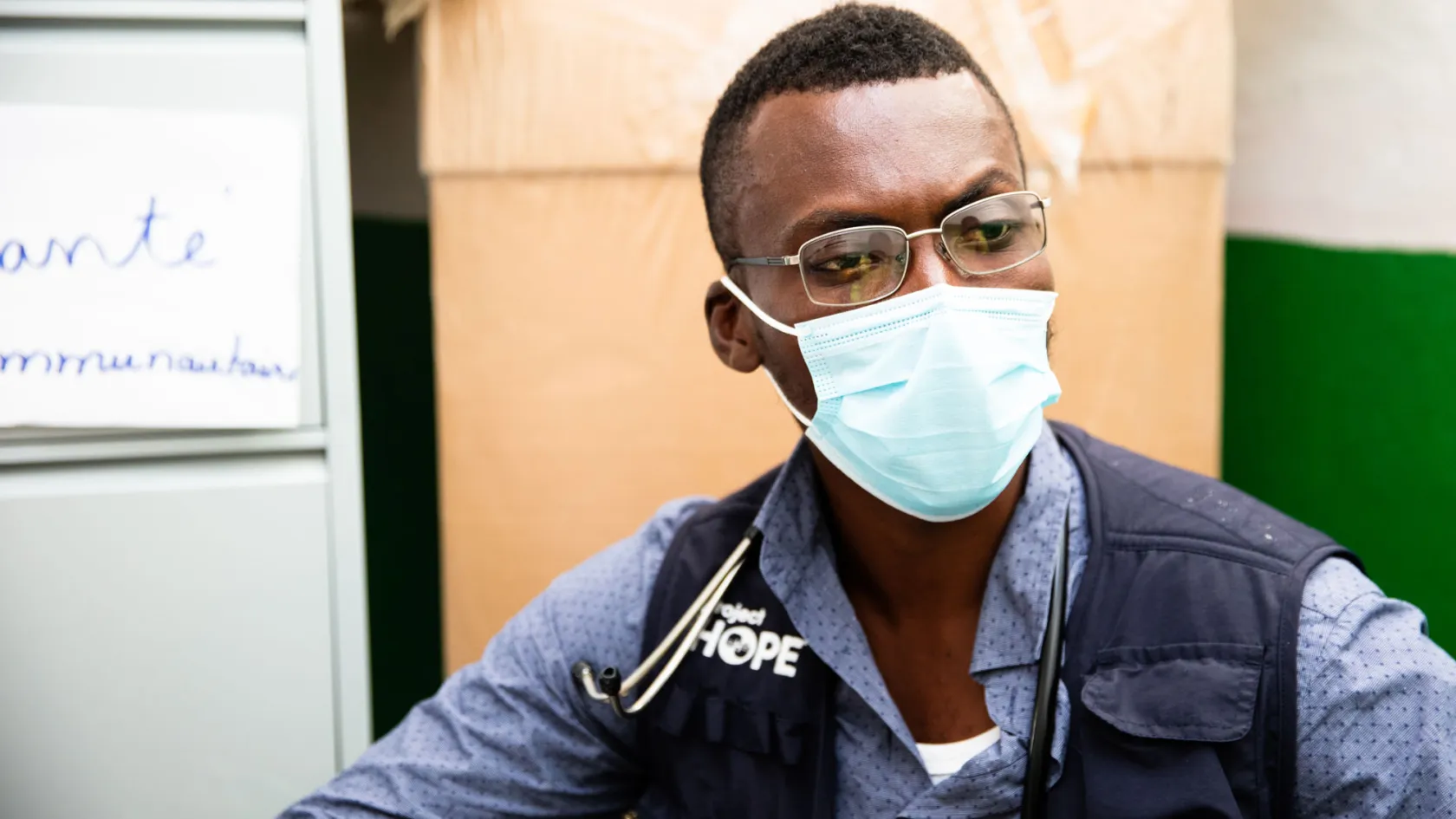Crisis in Ukraine: How to Help
Project HOPE is on the ground responding to the health and humanitarian needs of communities affected by Russia’s violent attacks on Ukraine. Learn more about this ongoing crisis and how you can help.
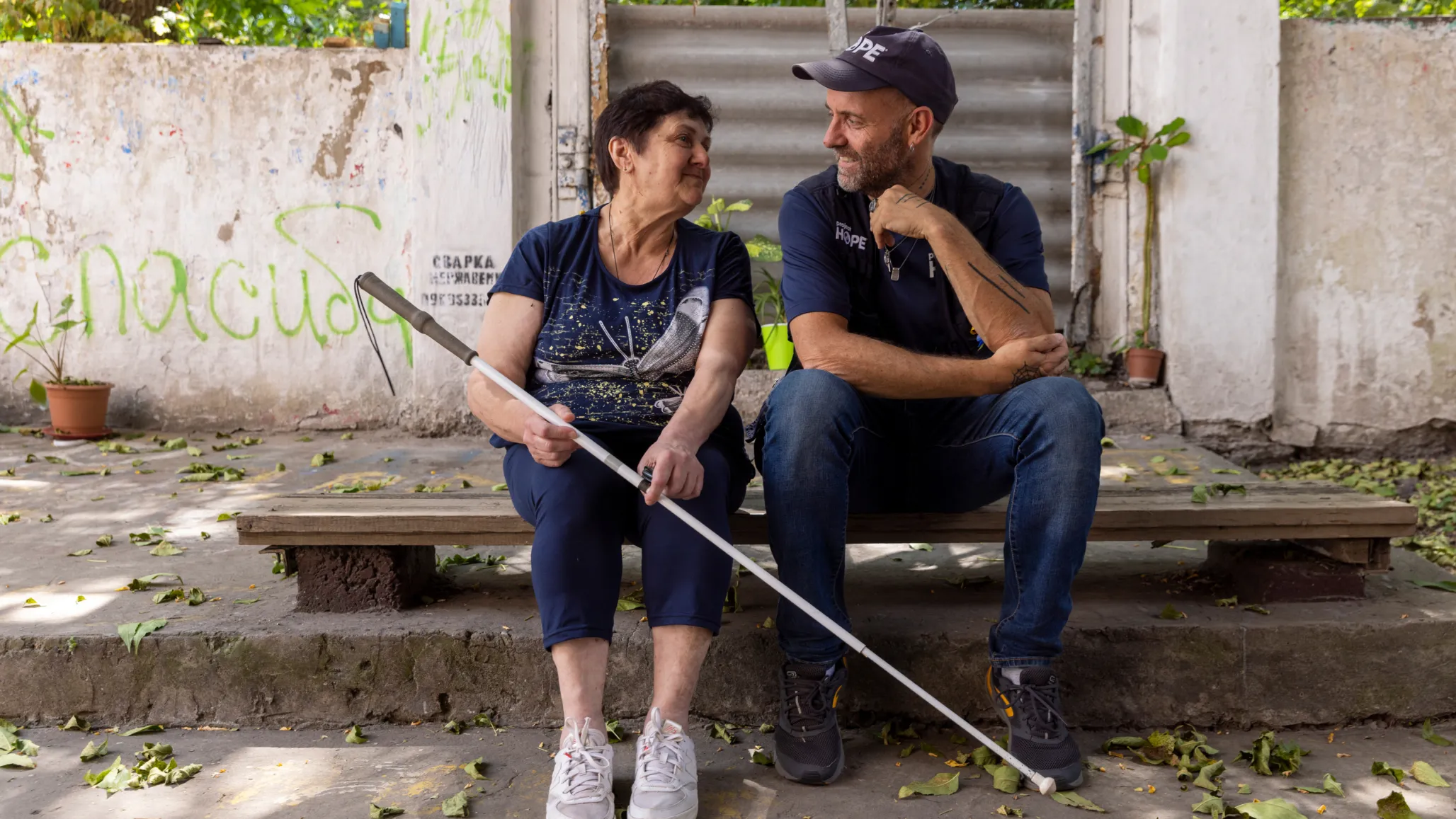
What you need to know
More than three years into Russia’s full-scale invasion of Ukraine, thousands of children and civilians have been killed and over 10 million people are displaced. The entire population of Ukraine is living through unimaginable atrocities and enduring multiple humanitarian crises.
There have been more than 2,100 attacks on health care facilities, staff, and transport vehicles since the conflict erupted, and the invasion has devastated local health systems in communities near the front lines. Project HOPE is working hand in hand with local health workers, government officials, and other partners to meet the health and humanitarian needs of Ukraine’s resilient communities.
Project HOPE has nine regional offices in Ukraine and is supporting health facilities in all 24 oblasts. Our team is focused on strengthening the country’s health system by training local health workers and providing urgently-needed primary health; mental health and psychosocial support (MHPSS); protection; and water, sanitation, and hygiene (WASH) services.
The conflict has also had a profound impact on neighboring countries that have taken in large numbers of refugees. In Poland and Moldova, Ukrainian refugees and host community members face gaps in essential services like primary health, mental health, and protection. Project HOPE is working in both countries and coordinating with partners to strengthen local health systems and provide those affected by displacement with primary health, mental health and psychosocial support (MHPSS), and protection services. From 2022-2023, our team also responded to refugee needs in Romania.
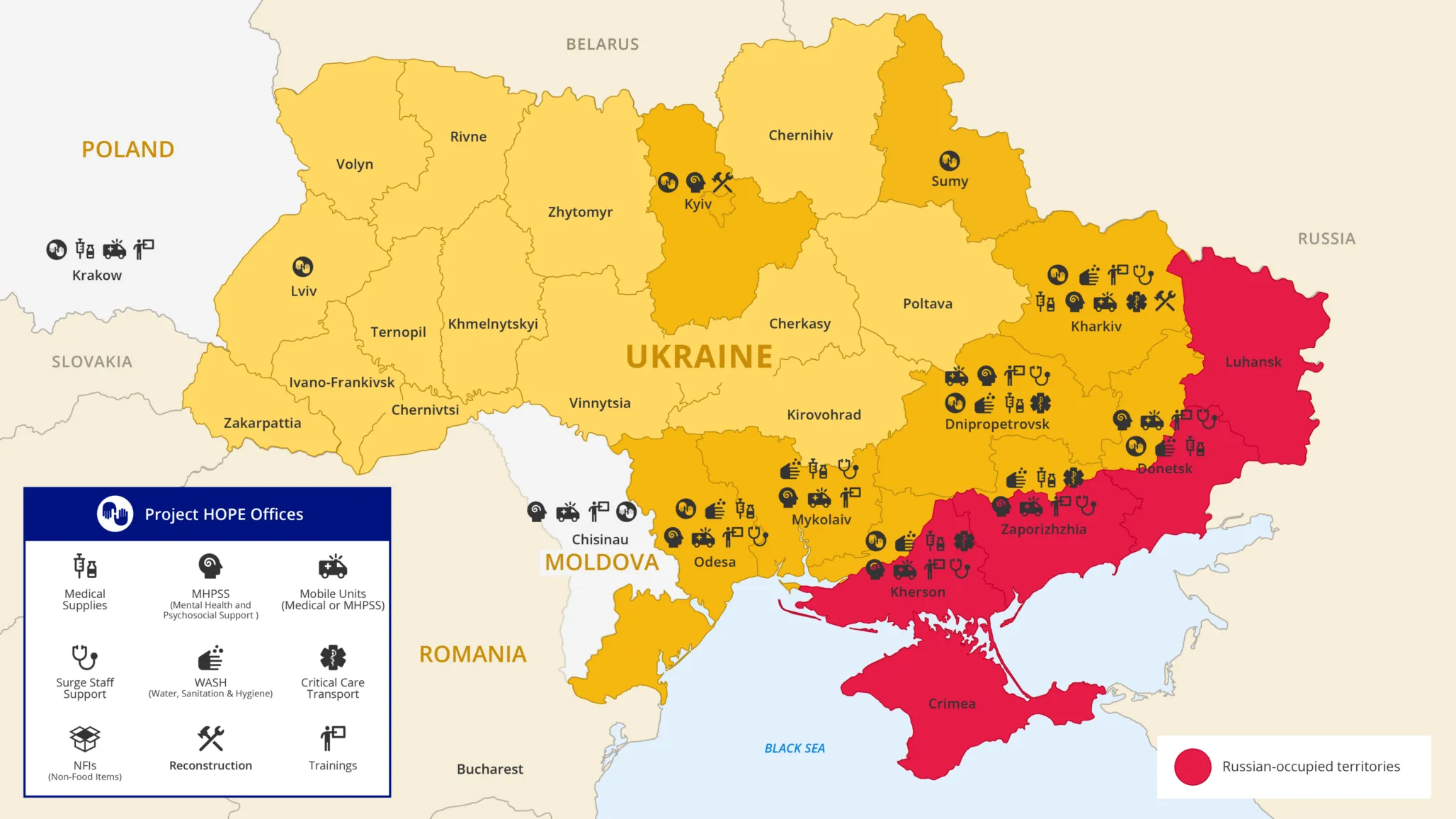
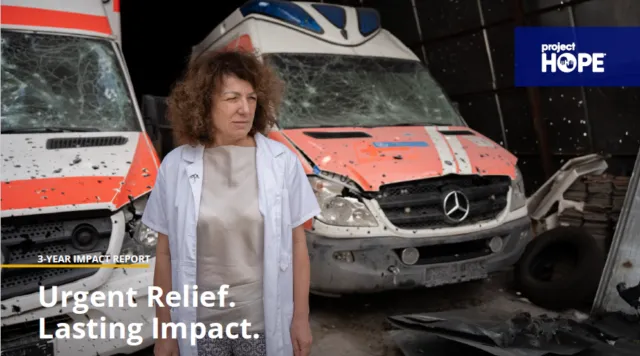
Highlights from our 3-Year Impact Report
• Delivered essential pharmaceuticals, medical supplies and equipment worth over $15 million
• Operated 64 mobile medical units and incentivized staff at 40 health facilities, providing care to over 1 million patients
• Trained nearly 12,000 health care workers in basic life support, mental health, and other skills
• Reconstructed and repaired 16 health and social facilities, improving care for over 143,000 people for years to come
• Supplied nine ambulances to equip first responders with the tools they need to conduct over 23,000 patient transportations
• Provided MHPSS services to more than 238,000 people at eight Project HOPE MHPSS Centers, five IDP centers, 41 Hospitals (in-person and virtually), and 18 mobile medical units
• Distributed nearly 9 million liters of clean drinking water and over 178,000 WASH items
What are the greatest needs in Ukraine?
Russian attacks have caused extensive damage to infrastructure — from schools and hospitals to gas and electricity lines — which has limited access to essential goods and services. Project HOPE has completed multiple reconstruction projects across Ukraine and continues to coordinate with local governments and partners to support communities impacted by the destruction.
Our team has identified immense needs in primary health; mental health and psychosocial support (MHPSS); the reconstruction of health infrastructure; gender-based violence protection; water, sanitation, and hygiene (WASH); and winterization, all of which Project HOPE is actively addressing through our programs in Ukraine.
Our History in Eastern Europe
Ukraine
Project HOPE began working in Ukraine in 2002 with a life-skills program focused on drug use prevention, HIV prevention, and education for children in primary schools. In 2007, Project HOPE began a five-year, USAID-funded HIV/AIDS Service Capacity project in Ukraine, which focused on the mobilization of communities most at risk of contracting and transmitting the disease.
From 2012-2017, Project HOPE helped improve the health of Ukrainians by partnering with the Government of Ukraine to decrease the incidence and strain of tuberculosis (TB) on Ukraine’s health system and improve outcomes for people living with TB.
Poland
Project HOPE has supported Poland’s health system for nearly 50 years. In 1974, Project HOPE was invited to assist the Polish-American Children’s Hospital (PACH) — now University Children’s Hospital of Krakow — to create education programs for health professionals serving the hospital. By 1975, Project HOPE had completed a medical research facility adjacent to the hospital, and then in 1988 a 240-bed rehabilitation center was built.
We continue to work with University Children’s Hospital in Krakow to meet the needs of Ukrainian refugees, including the opening of a mental health and psychosocial support center for refugees and two refugee child playrooms. Through our local partners, Project HOPE has helped more than 7,500 children from Ukrainian refugee families access medical services, provided mental health services to more than 8,292 Ukrainian refugees and host community members, and supported more than 800 Ukrainian refugees with disabilities with physiotherapy, rehabilitation, and psychological support services.
Now, with nearly 1 million Ukrainian refugees living in Poland, Project HOPE Polska is directly providing MHPSS services to refugee shelters and implementing critical social cohesion, mental health, accessibility initiatives in host communities.
Moldova
To support the needs of Ukrainian refugees and Moldovan families, Project HOPE launched mobile medical units in 2024. Previously, our team partnered with The Moldova Project to establish nine child playrooms in Moldova — which gave Project HOPE’s local partners the space necessary to provide 7,662 Ukrainian refugees and Moldovan families, including 4,581 children, with MHPSS services, food, hygiene kits, and medical vouchers.
Project HOPE also worked with the local organization Regina Pacis to set up a Holistic Assistance Center for Ukrainian refugees and families in vulnerable positions in Moldova. The Center has provided 2,159 people with medical and psychological assistance, referrals to health services, information on how to access education services, asylum procedure assistance, and/or employment aid.
Project HOPE also partnered with Casa Marioarei (The Association Against Domestic Violence), which provided GBV prevention, job and livelihood trainings, as well as social integration services to 2,462 Ukrainian refugees and host community members, including 809 children.
In 2022, Project HOPE delivered 86,500 insulin pens and 45 Interagency Emergency Health Kits to the Ministry of Health in Moldova. Project HOPE also delivered 500 sleeping pads to refugee shelters and 2,160 hygiene kits to the Ministry of Labor and Social Protection for distribution to shelters, women and child centers, and other facilities. Project HOPE previously supported an Emergency Medical Team (EMT) from SAMU, which provided emergency and ongoing medical services and medications to around 1,800 refugees in the first four months of the war.
Romania
In Romania, Project HOPE partnered with five local organizations to provide relief to Ukrainian refugees seeking safety, including mental health support. Our team on the ground distributed hygiene kits that include toothpaste, toothbrushes, diapers, and more for refugees.
Project HOPE also partnered with a local organization, La Rascruce Association, to support Ukrainian refugees crossing into Romania through the Sculeni border point. La Rascruce staff and volunteers provided Ukrainian refugees with vital information, registration support, and basic needs such as hot meals, water, hygiene items, transportation, and accommodation. Our partner also provided refugees with MHPSS services, Romanian classes, and vouchers that can be used to buy essential supplies at their Integration and Relocation Center in Iasi, Romania. From January to June 2023, La Rascruce supported a total of 9,562 Ukrainian refugees.
How you can help Ukraine
The war in Ukraine has displaced millions of people and led to a humanitarian catastrophe that impacts women, children, families, and entire communities made vulnerable by this crisis. If you want to help, here’s how you can get involved:
1. Make a lifesaving gift to support our work now and for the future. Project HOPE stands ready to assist the Ukrainian people with health and humanitarian aid, both in Ukraine and in surrounding countries. Our emergency response team and European partners are sending critically needed medicines, medical supplies, and mental health support as the crisis unfolds. Please join our efforts by making a lifesaving gift to our Ukraine response today so we can continue supporting the needs of those affected by this crisis.
2. Fundraise for Ukraine by streaming on Tiltify to raise money for Project HOPE. If you’re a content creator, you can start a charity stream on Tiltify to Stream for HOPE and raise funds for Project HOPE’s mission. Tag us on social @projectHOPEorg to let us know about your charity stream so we can thank you!
3. Interested in an employee giving campaign for Ukraine? Please contact us – we are happy to help.
4. Stay up-to-date on this story and our lifesaving work around the world by following us on Facebook, Instagram, LinkedIn, and X/Twitter, and help spread the word about our response.
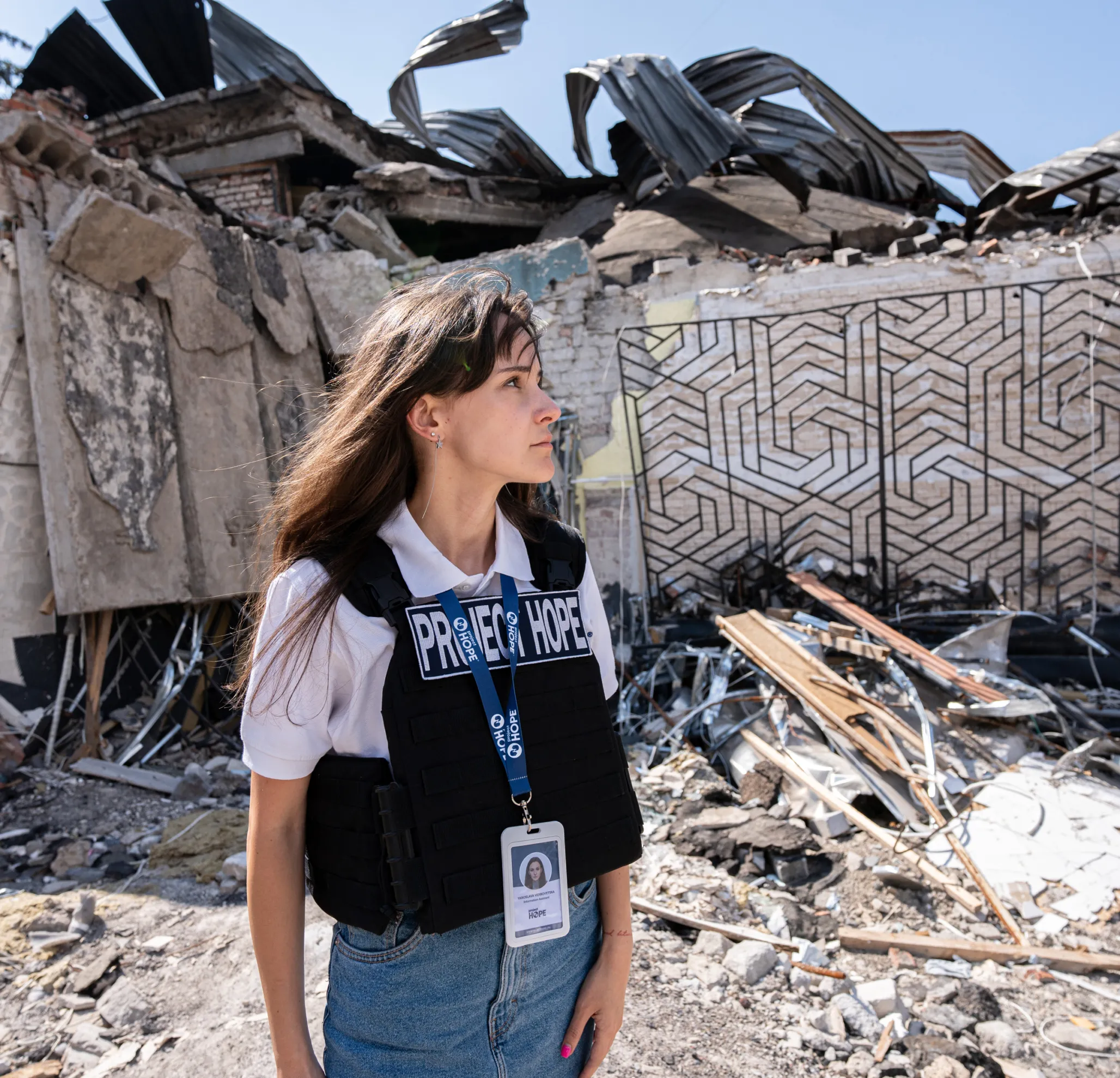
A Visual Timeline
Russia’s full-scale invasion of Ukraine in February of 2022 set off a humanitarian crisis that continues to ripple across the region. As the conflict evolved, Project HOPE grew its emergency response into a comprehensive humanitarian intervention that has reached more than 1.9 million people across four countries.

